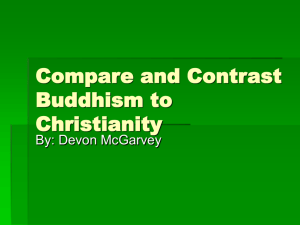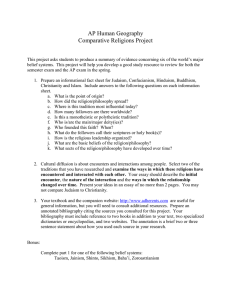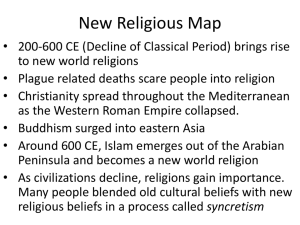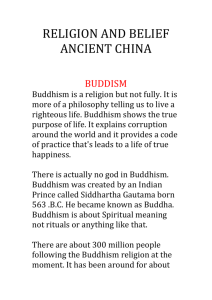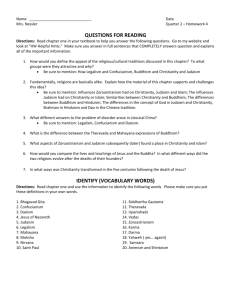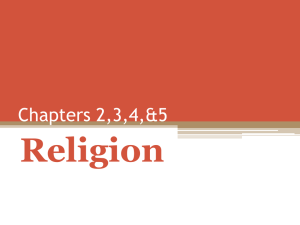WHAP Unit 2 Formative KC 2.1 (#2)
advertisement
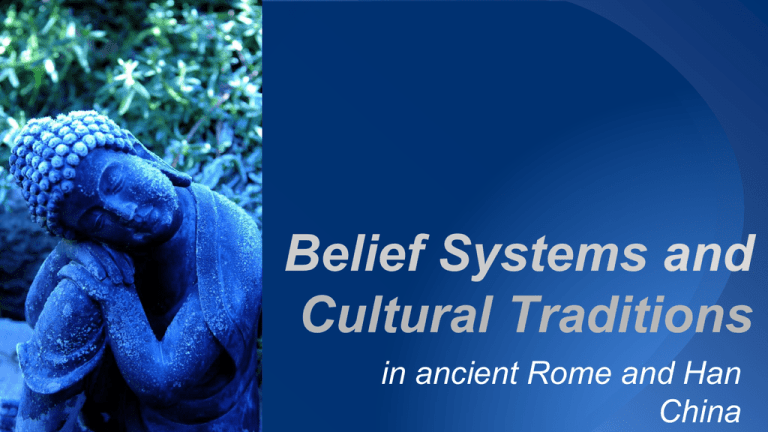
Belief Systems and Cultural Traditions in ancient Rome and Han China There are five main beliefs systems and cultural philosophies that emerged between 600 BCE and 600 CE. These systems were Buddhism, Confucianism, Daoism, Christianity, and Greco-Roman philosophies. Buddhism: Teachings of Enlightenment Buddhism is a nontheistic religion founded by Siddhartha Gautama in Northeastern India. This belief has about 300 million followers. The basic beliefs of Buddhism include karma, Four Noble Truths, the Cycle of Rebirth, and the Noble Eightfold Path. Four Noble Truths: ● ● ● ● Life is suffering Suffering comes from desire Solution to suffering lies in restraining desire Following the Eightfold Path can curb desire Noble Eightfold Path: ● ● ● ● ● ● ● ● right views right aspirations right speech right conduct right livelihood right effort right mindfulness right meditation http://www.pbs.org/edens/thailand/buddhism.htm Types of Buddhism: ● ● Theravada Mahayana Both encompass the same teachings and practices, but have different purposes. Theravada wants to achieve nirvana for relief of suffering, and Mahayana want to achieve nirvana for happiness. Confucianism: Promoting Social Harmony Confucianism is an ethical belief system that stems from the teachings of Confucius. His teachings were started during the Zhou Dynasty, but were not fully adopted and popular until later when the Qin and Han dynasties prevail. The philosophy’s basis is benevolence, avoidance of violence, justice, rationalism, loyalty, and dignity. ❏ ritual and etiquette ❏ love within the family- parents love their children and children love their parents ❏ righteousness ❏ honesty and trustworthiness ❏ benevolence and humanity towards other ❏ loyalty to state http://philosophy.lander.edu/oriental/main.html Greco-Roman Philosophy & Science Greco-Roman Philosophy comes from the idea of Greek influences on the Romans. The main ideas around greco-roman philosophies/science were logic, empirical observation and the nature of political power and hierarchy. Platonism: Any theory that is based off of Plato’s original philosophies. Plato developed a philosophy regarding “forms”. Forms were Plato’s theory of realities that were eternal and never changed. His beliefs centered around the quality of life including religion , politics and ethics. Aristotelianism: Any theory based off Aristotle’s (Greek) original philosophies. Aristotle derived his beliefs from an influence of Socrates’ and Plato although altered some of the teachings from his mentors. Cynicism: The theory of believing humans are selfish, dictated by emotions, and are barbaric by nature. Epicureanism: Developed by Epicurus in Athens. The theory that although gods do exist, the highest meaning of life is to seek pleasure before we die, not abide by the gods. They believed politics were pointless. From the outside Epicureanism seemed to be looked at as selfish. Stoicism: Developed in Athens, the stoics believed that a person of perfect intellectual and morals would not suffer destructive emotions. Through a focus on human knowledge, and logic they believed everyone was equal even slaves. Skepticism: Skepticism derived from the word skepsis which meant to examination, inquiry and consideration. Skeptics always had opinions even if not aware of the knowledge of the subject. There were two types of skepticism academic and pyrrhonian. http://www.britannica.com/EBchecked/topic/464215/Platonism http://philosophyforlife.org/philosophies-for-life/epicureans/ http://www.philosophybasics.com/movements_aristotelianism.html http://en.wikipedia.org/wiki/Cynicism_(contemporary) http://www.iep.utm.edu/skepanci/ http://en.wikipedia.org/wiki/Stoicism Christianity’s Expansion and Origins Christianity is the religious base of life and teachings of Jesus of Nazareth. Christianity is the worlds largest religion with over 2.2 billion followers and 21,000 denominations. Rise ● Christianity originated with the Messianic Prophecies in the old testament that were written in the Law of Moses , the Prophet and the Psalms stating that Jesus, the Messiah and the savior, was coming ● Christianity originated in the city of Jerusalem in present day Israel ● The founder of christianity is Jesus Christ, who was born in Bethlehem ● The Messianic Prophecy was fulfilled by Jesus Christ ● The Jews who accepted Jesus as their savior became know as Christians Spread ● Christianity spread initially from Jerusalem to places such as Mesopotamia, Assyria,Syria, and Egypt. ● Christianity mainly spread through missionaries in the early days(St. Paul was the first missionary and was the first to spread Christianity), a missionary someone who does religious work in foreign land ● Many people converted to christianity to have a equal afterlife and many people gravitated to have new new hope ● Jesus and his disciples went from village to village teaching Jews how to Repent to Restore faith and forgiveness to ensure everlasting life in spirit for those who believed in him, and God the Father. http://www.evidenceforchristianity.org/where-did-christianity-originater/ http://www.waupun.k12.wi.us/Policy/other/dkhut/religions/22%20Spread%20of%20Christianity.html Daoism: The balance between human and nature & Medical Theories/Practices Daoism is a philosophy, similar to that of Confucianism. Daoism surfaced during the Warring States period and its originator, Laozi, sought for peace. He urged people to follow the “path” or dao. This philosophy focuses on acceptance of any events that occur, by avoiding unnecessary struggles, violence, and allowing the “path” to guide you. The Daoist belief is that the world has no meaning, which evokes the philosophy’s main purpose- simply following the path. It also focuses on the balance of a persons’ physical and spiritual nature (Yin&Yang). Daoism Influence on Medical Theories: Some early Daoist philosophy was associated with magic and mysticism. From this stemmed alchemist Daoism. This included the search for an idea to live longer through diet, exercise, meditation, and herbs. One strong medical theory that came from Daoist teachings was the idea of conducting oneself by the seasons. In the winter, where Yin was strongest, go to bed early and wake up late. In summertime, where Yang was strongest, go to bed late and wake up early. This was keeping one’s self balanced. In the winter you were conserving your energy and weighing on your physical nature. In the summer time you were weighing on your spiritual nature and experiencing outdoors. http://www.arcworld.org/faiths.asp?pageID=35 http://www.fofweb.com.gatekeeper.chipublib.org/NuHistory/default.asp?ItemID=WE49
